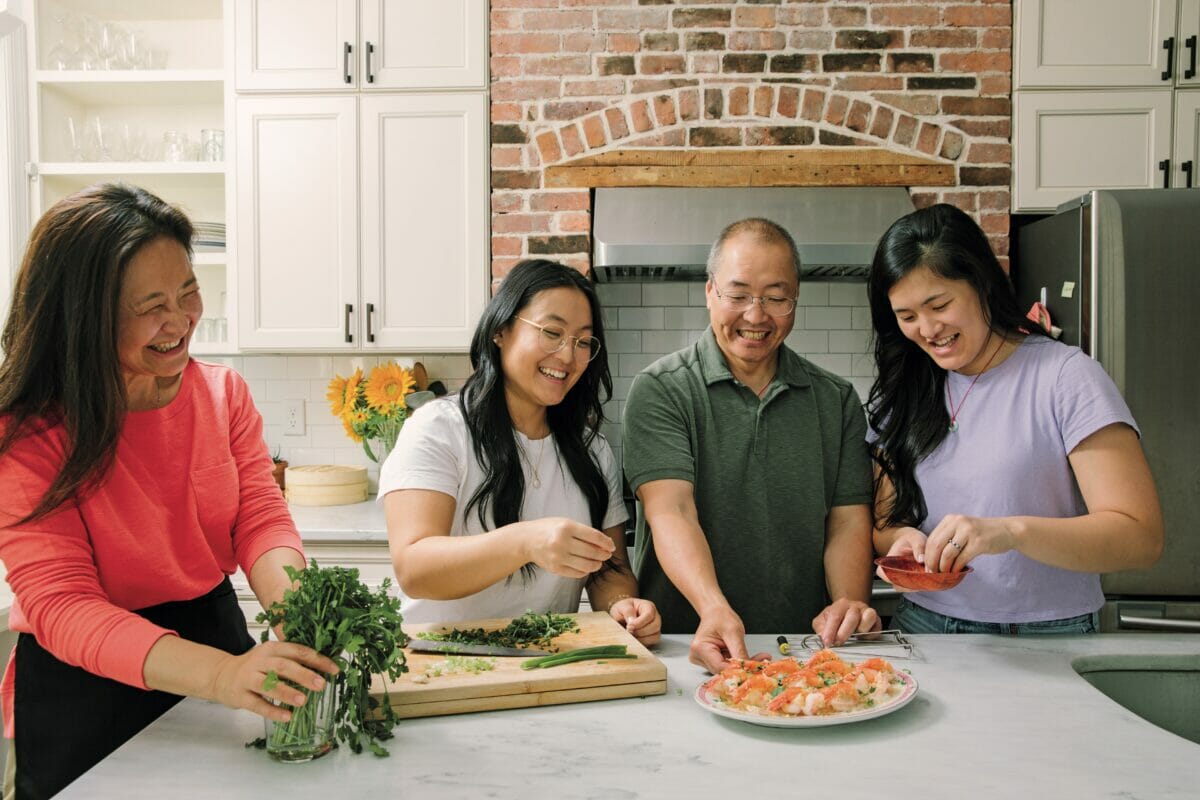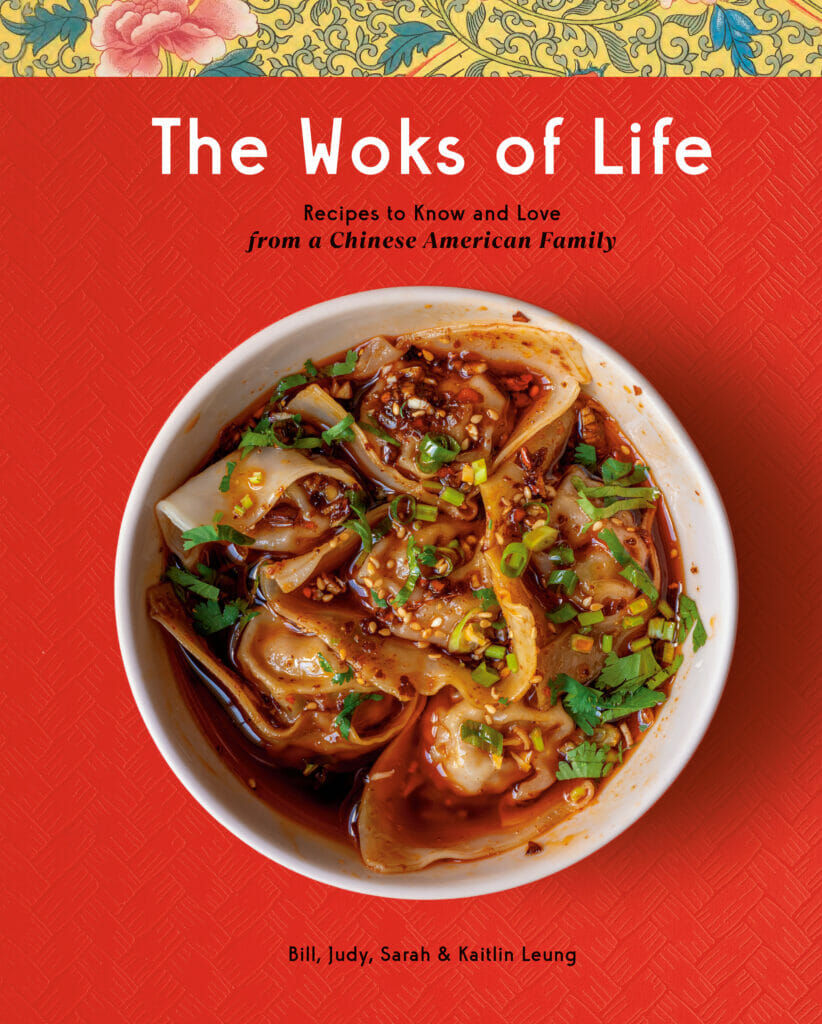The family behind “The Woks of Life” blog has a new cookbook, which highlights just how much cooking and gardening traditions bond us together.

To speak with the Leung family is to find yourself dropped directly into the middle of a conversation that has spanned decades. Speaking over each other, laughing at each other’s jokes and making references to long-time family legacies, the Leungs are boisterous and funny, comfortable and happy to be together. It’s exactly the vibe you want when you sit down at a kitchen table.
This is lucky, because the Leungs have made a business out of cooking together.
The story of their blog, The Woks of Life, begins in 2013, when parents Bill and Judy moved to Beijing for work, while daughters Sarah and Kaitlin stayed behind in the US to attend college. Quickly, the family group chat was filled with photos of what everyone was cooking or eating. Food became a way for the family to check in on each other. “Everyone OK?” That’s a message that could easily be answered with a snap of a steaming bamboo tray of dumplings or a bubbling plate of spaghetti and meatballs.
But while food connected the clan, Sarah and Kaitlin found there was still a disconnect. They didn’t know how to make the same recipes they had grown up eating, the recipes that Judy and Bill had cooked for years at the family restaurant. The daughters wanted to learn.
So Sarah started the blog to document the important recipes in her family. Now, nearly 10 years later, the Leungs have a loyal following and a new cookbook, also called The Woks of Life. In it, they share not just the recipes they’ve spent years perfecting but the stories of their family. Interspersed with instructions on how to make the perfect hot and sour soup or braised pork belly are family photos and essays, little glimpses into the family that is literally inviting you to share a meal with them.
Now, all four members live near each other in New Jersey, where Judy and Bill have a small plot of land to garden and raise chickens, alpacas and ducks. Modern Farmer got a chance to sit down with the Leung family to talk about their new book and how they judge each other’s recipes.
This interview has been edited for length and clarity.
Modern Farmer: Obviously, food is very important to your family. When did growing your own food become important to you all?
Bill: [When I was growing up], we lived in upstate New York, and when I was five, my mother just took a hoe to the backyard and dug a pretty sizable garden. She would grow Chinese vegetables, like snow peas [and] beans, and she was good at it. She really had a green thumb. It came so naturally to her that when I started doing it on my own, I was like damn, this is hard.
Sarah: Was she growing those vegetables because you guys were deep in the boonies and didn’t have access to Chinese vegetables?
Bill: That was a big reason. But she also grew up in a farming community, and she used to tell me stories about going to the fields and planting rice and riding the water ox!
But it’s always been organic. I refuse to put any kind of commercial, conventional fertilizer there. Over the last year, we’ve really spent a lot of time and focus on composting and replenishing the soil.
MF: That must keep you busy. Who is the recipe developer among you all? Who comes up with the ideas?
Sarah: Well, all four of us contribute equally on the recipe front. In the book, about 25 percent of the recipes are done by each of us, and there was a lot of recipe switching, too. If one of us would get stuck on one of our recipes, and we’ve done it eight times already and it’s just not coming together, we could switch between us.
Once the recipe is developed, and you cook it and feel confident about it, then the other three family members taste it and give their comments.
MF: Judy, Bill, you guys worked in Bill’s parents’ restaurant, so I would assume that a lot of these dishes you’ve been cooking for a long time. How do you approach something that is so classic to try and find a new angle on it?
Kaitlin: For us, it’s not about finding a new angle. It’s about finding the problems that the average person will have, trying to anticipate the speed bumps in the kitchen and adapt them.
Bill: Sometimes, it’s just slight improvements on the recipe. Maybe changing up the ratio of oyster sauce or soy sauce. Judy said it the other day, that every recipe can be improved—and it’s true. And we do that often. Once we reach the point where we’ve tweaked it enough, then we’ll actually publish it.
Kaitlin: This cookbook is our family’s story told through food. When we approach these kinds of recipes, we’re trying to preserve what we feel is the most perfect, nostalgic version of what that recipe is. In your head, if you have this taste memory of a dish, that’s how we approach a lot of the recipes. And you know, hopefully, other people find that they’re familiar and kind of bring comfort.
MF: The book certainly is your family’s story, not just with the recipes but the pictures and memories shared. How did you come to the decision to get so personal with it?
Sarah: On the blog, our tagline is “a culinary genealogy.” We wanted the cookbook to feel like part family album, part cookbook.
You know, for my mom’s scallion pancake recipe, she tells a story of how she used to take a few pennies to buy a scallion pancake from a street vendor. And this recipe is how she remembered them tasting.
Because this has always been a family project, with a sense of passing recipes and traditions down from one generation to the next. That had to sort of be reflected in the book.
MF: Do you still check in with each other on food?
Bill: I think it’s a Chinese thing. When you’re on the phone or greeting someone, you don’t say “what’s going on?” You say “have you eaten yet?”
